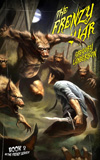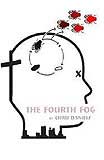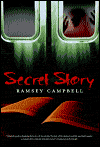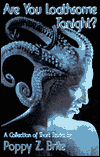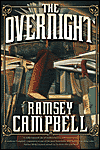
The Overnight, by Ramsey Campbell
Book Review by Phillip A. Ellis
Have you read this book?
Contemporary horror fiction is a strange beast. Much is overstated and florid, horror as primers of the gross and grotesque, and much reads as bad parodies of Derleth's Mythos tales. Yet here and there, there remain dissidents, quietly working artisans of the weird that seek to bestow a frisson of unease rather than a gag reaction of disgust. Ramsey Campbell is among this latter breed.
For the wide-read aficionado of horror, Campbell deserves no introduction. His approximately four decades in publishing horror fiction have produced a large and uniformly excellent body of writing. He has won critical acclaim, gathering numerous accolades from both critics and colleagues, despite the relative paucity of his sales, compared to Stephen King or Clive Barker. He has been feted by many in the horror industry, yet he works, nonetheless, quietly, producing books and stories that bear acute psychological insights, and the capacity to make us question ourselves and our perception of reality.
Yet, despite being a major writer of contemporary horror, Campbell nonetheless found the need to take a job elsewhere for a short while. He worked, then, in a large bookshop for several months, a decision which apparently shocked many of his colleagues. Yet, as a result of this experience, he found the inspiration and ideas to write his latest novel of the supernatural, The Overnight.
Briefly, the novel is set in a the latest of a chain of large bookshops, in the industrial estate of Fenny Meadows. The weather is uniformly dour: the days, and nights, are almost continually foggy, and there are few customers. In addition, the American owners are due for an inspection, so, before they are due, an overnight inventory of the stock is planned. Yet not all works seamlessly. The computers are playing up, orders go missing, and books are damaged or scattered after shelving. Events, however, take on a sinister turn with an accident involving a staff member, and tensions among the staff increase as a result. The inventory, then, does not look as if it will be a success.
Like a number of his earlier books, there is no central character that unifies the narrative. Instead, each chapter focuses upon one character, interlacing their stories into a nearly seamless whole. In this way, the interior life of the whole is explored, and the overall effects of the events and situation becomes manifest. As with the whole of his oeuvre, the characterisation displays considerable psychological insight. The characters themselves become believable, and their psychological development becomes not only convincing but also suspenseful, despite the largely measured pace.
This suspense is aided in large part due to the use of the present tense to narrate the events. Although it may seem initially off-putting to those accustomed to the more widespread use of the past tense, it nonetheless helps to create a sense of immediacy and urgency to the book as a whole. It also helps to affect our perception of time, which becomes a major factor in the latter half. In the hands of a less accomplished writer, such a move would have failed.
Likewise, Campbell's mastery of the genre is easily evident. He does not need to produce scenes of explicit horror, for he easily demonstrates both how manifest and latent horror can exist together. He relies, then, more on suggestion, cutting away from the more visceral scenes, then coming back to explore the results, through another's viewpoint. As a result, then, what we get is a measured, literate exposition that chills rather than alarms, causes lasting unease rather than revulsion. What is important is the central idea, and its effects upon the circumscribed world of the bookshop.
A major factor in this success, then, is an emphasis upon place. The novel could be read as a sort of haunted house, yet the horror transcends it, going further. This emphasis upon place is a major factor in Campbell's fiction. It as if he has specialised in a psychogeography of horror throughout his career, looking at the locus of place and the events that occur therein. As with his earlier explorations of Liverpool, the Fenny Meadows of this novel is an acutely realised and disturbing place, and the central cause of the supernatural phenomena is as rooted to the soil as it is in such works as Ancient Images.
And again, like many of his other works, this is, overall, a cheerless book. The oppressive atmosphere of tension and the fog appears to seep into the language and narrative. As a result, then, it could be easy to see the book as uniformly depressing: the ending is not cheerful, uplifting, but almost completely bleak. Hardly anyone wins, in a sense, free from the darkness that surrounds them. This bleakness brings to mind others' accusations that Campbell's work is uniformly depressing. A careful reading, however, of this novel belays such an assessment; the ending is not forced, and despite the effects upon seeing characters the reader can easily sympathise with, their fates seem as unforced and as inevitable as is possible from the book's events. Thus, in a sense, the book develops a power to unnerve that long outlasts the act of reading.
Yet, for whom is this book a good read? For the most part, those readers of speculative literature who are not enamoured of the supernatural in their fiction will find this difficult going. So too will those who seek in their reading an uplifting message, or who are more attuned to the soap operatic approaches of many other writers. This is not, that is, an easy read; it requires an ideal reader attuned to Campbell's subject and style, and one capable of encompassing the bleakness that informs so much of this book. Thus, I don't expect this to achieve bestseller status.
But it remains, nonetheless, important, both as a work of fiction in general, and as a work of horror fiction specifically. It constructs, in a way, a world in itself, and it constructs the rules through which the events of that world occur. In doing so, it follows from the realism demanded by H. P. Lovecraft for all weird literature. The central supernatural phenomenon is, then, created in as realistic a way as possible, and in doing so it conveys a worldview that demands a reassessment of what makes us human. That is, what causes the events is of a nature to cause us to question who, and what, we are, and whether humanity is as exalted as we might desire. The critic S. T. Joshi sees weird literature as a more inherently philosophical branch of speculative literature, compared to others, and this work upholds such a notion.
Not that this novel preaches. It does not, but is content to create an atmosphere and situation where we cannot feel ultimately safe or comfortable. This is not a book to comfort yourself with, but it is a book to confront our fears, the sort that seize us at night, rather than in the comfort of a safe place. With it, we can confront ourselves, and, perhaps, derive some lasting insight into our world and our place in it. And in the process of doing so, we may find ourselves unnerved, and, perhaps, changed.
For the wide-read aficionado of horror, Campbell deserves no introduction. His approximately four decades in publishing horror fiction have produced a large and uniformly excellent body of writing. He has won critical acclaim, gathering numerous accolades from both critics and colleagues, despite the relative paucity of his sales, compared to Stephen King or Clive Barker. He has been feted by many in the horror industry, yet he works, nonetheless, quietly, producing books and stories that bear acute psychological insights, and the capacity to make us question ourselves and our perception of reality.
Yet, despite being a major writer of contemporary horror, Campbell nonetheless found the need to take a job elsewhere for a short while. He worked, then, in a large bookshop for several months, a decision which apparently shocked many of his colleagues. Yet, as a result of this experience, he found the inspiration and ideas to write his latest novel of the supernatural, The Overnight.
Briefly, the novel is set in a the latest of a chain of large bookshops, in the industrial estate of Fenny Meadows. The weather is uniformly dour: the days, and nights, are almost continually foggy, and there are few customers. In addition, the American owners are due for an inspection, so, before they are due, an overnight inventory of the stock is planned. Yet not all works seamlessly. The computers are playing up, orders go missing, and books are damaged or scattered after shelving. Events, however, take on a sinister turn with an accident involving a staff member, and tensions among the staff increase as a result. The inventory, then, does not look as if it will be a success.
Like a number of his earlier books, there is no central character that unifies the narrative. Instead, each chapter focuses upon one character, interlacing their stories into a nearly seamless whole. In this way, the interior life of the whole is explored, and the overall effects of the events and situation becomes manifest. As with the whole of his oeuvre, the characterisation displays considerable psychological insight. The characters themselves become believable, and their psychological development becomes not only convincing but also suspenseful, despite the largely measured pace.
This suspense is aided in large part due to the use of the present tense to narrate the events. Although it may seem initially off-putting to those accustomed to the more widespread use of the past tense, it nonetheless helps to create a sense of immediacy and urgency to the book as a whole. It also helps to affect our perception of time, which becomes a major factor in the latter half. In the hands of a less accomplished writer, such a move would have failed.
Likewise, Campbell's mastery of the genre is easily evident. He does not need to produce scenes of explicit horror, for he easily demonstrates both how manifest and latent horror can exist together. He relies, then, more on suggestion, cutting away from the more visceral scenes, then coming back to explore the results, through another's viewpoint. As a result, then, what we get is a measured, literate exposition that chills rather than alarms, causes lasting unease rather than revulsion. What is important is the central idea, and its effects upon the circumscribed world of the bookshop.
A major factor in this success, then, is an emphasis upon place. The novel could be read as a sort of haunted house, yet the horror transcends it, going further. This emphasis upon place is a major factor in Campbell's fiction. It as if he has specialised in a psychogeography of horror throughout his career, looking at the locus of place and the events that occur therein. As with his earlier explorations of Liverpool, the Fenny Meadows of this novel is an acutely realised and disturbing place, and the central cause of the supernatural phenomena is as rooted to the soil as it is in such works as Ancient Images.
And again, like many of his other works, this is, overall, a cheerless book. The oppressive atmosphere of tension and the fog appears to seep into the language and narrative. As a result, then, it could be easy to see the book as uniformly depressing: the ending is not cheerful, uplifting, but almost completely bleak. Hardly anyone wins, in a sense, free from the darkness that surrounds them. This bleakness brings to mind others' accusations that Campbell's work is uniformly depressing. A careful reading, however, of this novel belays such an assessment; the ending is not forced, and despite the effects upon seeing characters the reader can easily sympathise with, their fates seem as unforced and as inevitable as is possible from the book's events. Thus, in a sense, the book develops a power to unnerve that long outlasts the act of reading.
Yet, for whom is this book a good read? For the most part, those readers of speculative literature who are not enamoured of the supernatural in their fiction will find this difficult going. So too will those who seek in their reading an uplifting message, or who are more attuned to the soap operatic approaches of many other writers. This is not, that is, an easy read; it requires an ideal reader attuned to Campbell's subject and style, and one capable of encompassing the bleakness that informs so much of this book. Thus, I don't expect this to achieve bestseller status.
But it remains, nonetheless, important, both as a work of fiction in general, and as a work of horror fiction specifically. It constructs, in a way, a world in itself, and it constructs the rules through which the events of that world occur. In doing so, it follows from the realism demanded by H. P. Lovecraft for all weird literature. The central supernatural phenomenon is, then, created in as realistic a way as possible, and in doing so it conveys a worldview that demands a reassessment of what makes us human. That is, what causes the events is of a nature to cause us to question who, and what, we are, and whether humanity is as exalted as we might desire. The critic S. T. Joshi sees weird literature as a more inherently philosophical branch of speculative literature, compared to others, and this work upholds such a notion.
Not that this novel preaches. It does not, but is content to create an atmosphere and situation where we cannot feel ultimately safe or comfortable. This is not a book to comfort yourself with, but it is a book to confront our fears, the sort that seize us at night, rather than in the comfort of a safe place. With it, we can confront ourselves, and, perhaps, derive some lasting insight into our world and our place in it. And in the process of doing so, we may find ourselves unnerved, and, perhaps, changed.
|
Click here to buy The Overnight, by Ramsey Campbell on Amazon
|
The Overnight, by Ramsey Campbell on Amazon

| More Books You Might Like |
Comment on The Overnight, by Ramsey Campbell
| Comments on The Overnight, by Ramsey Campbell |
| There are no comments on this book. |
